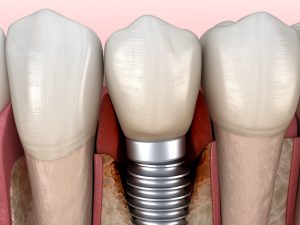
Dental implants are a consistently successful treatment. For more than 90% of patients, their new tooth roots last for many years — perhaps even for a lifetime. In rare cases, though, serious problems arise that make it necessary to surgically remove a failed dental implant. If you must soon undergo this procedure, it is understandable if you are a little nervous. Perhaps this brief guide on what to expect while removing a failed implant will address some of your concerns.
Every Case Is Unique
Not all dental implant removal surgeries are the same. Various factors, including the ones listed below, can influence the complexity of the procedure.
- The location of the implants. Removing implants from the upper jaw tends to be easier than taking them from the lower jaw.
- The length of time you have had the implants. The longer the implants have been in your mouth, the stronger their bond with your jawbone and the more challenging it may be to remove them.
- Nearby structures. Implants that are near a nerve or another critical structure take extra care to remove.
- The size of the implants. Long, narrow implants tend to be trickier to extract than shorter, wider ones.
The Removal Surgery
The dentist or specialist who removes the implant will use advanced imaging equipment to understand the implant’s location, depth, and angle in your bone. They will also consider what structures are nearby. Armed with that information, they can plan the details of your surgery.
During your surgery, your dental team will do what they can to make you comfortable. Both local anesthesia and sedation can ensure that you feel little to nothing while they are working. They will also take care to minimize damage to the tissue around the implant as they are removing it. Once the implant is out, they may perform a bone graft at the site to preserve your jaw’s shape and make it more likely that another implant can be placed in the future.
After the Procedure
It may take several months for the bone to heal at the removal site. However, the soft tissue should recover fairly quickly, and any post-op discomfort should dissipate within days or weeks. Be sure to attend all recommended follow-up appointments with your dental team so they can keep an eye on how your mouth is healing. Eventually, you may qualify to receive a new implant.
If you must deal with a failed dental implant, trust your dental team to perform the removal procedure as carefully as possible. They will do all they can to ensure that you experience safe, effective, and efficient treatment.
Meet the Periodontist
Dr. John C. Tunnell is an experienced periodontist and dental implant specialist who serves patients throughout the Dallas area. If you are concerned about the health of your dental implants or have questions about the removal procedure, he would be pleased to talk with you during a personalized consultation. To learn more about how he and our team may be able to serve you, contact us at 469-640-6730.
